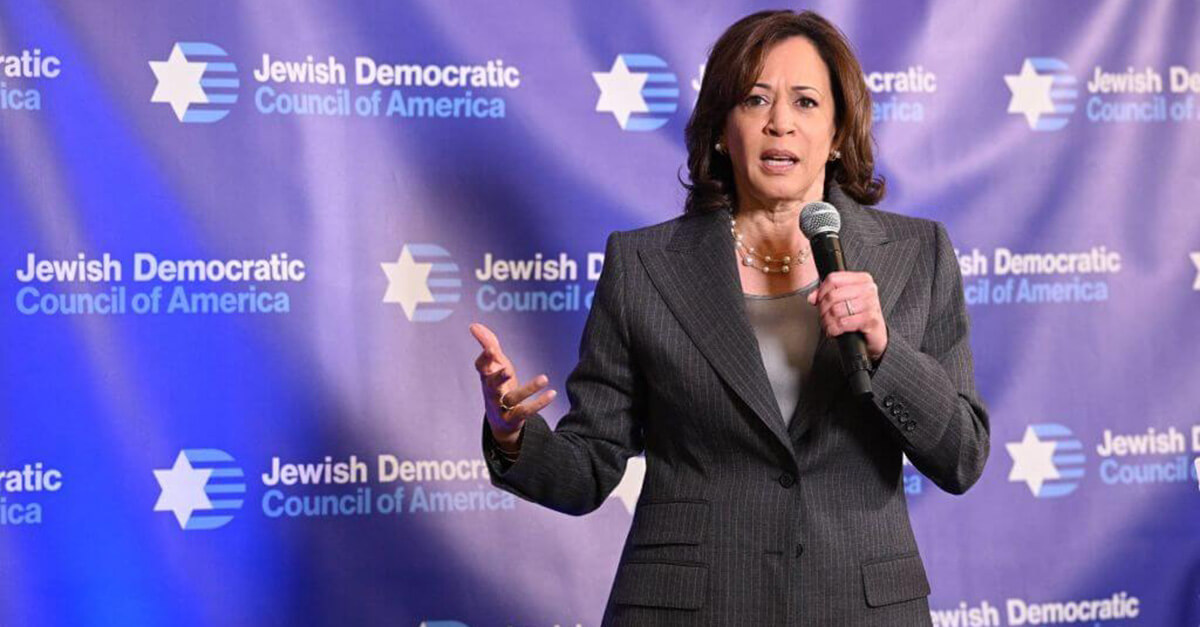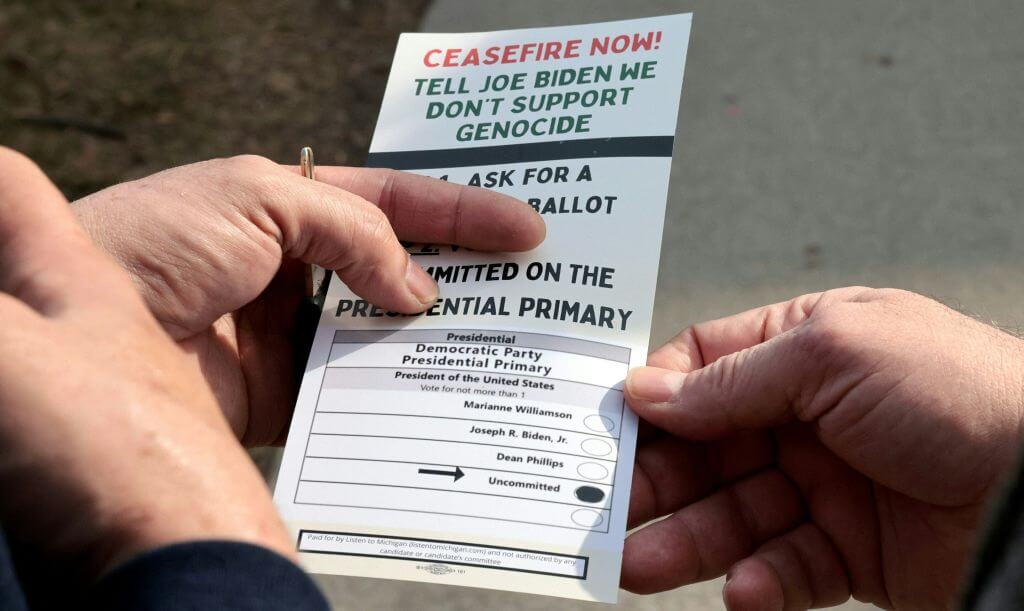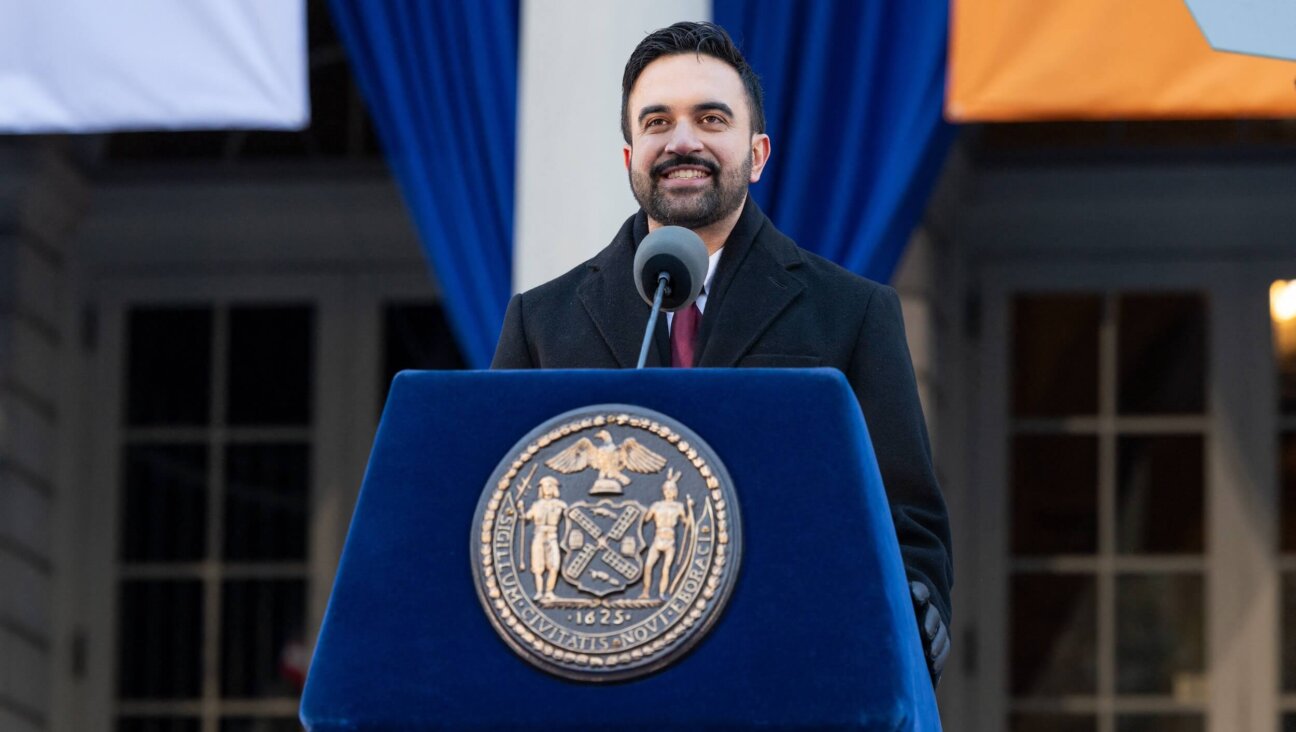Analysis: What would a Kamala Harris presidency mean for American Jews and Israel?
Vice President Harris’ husband, Doug Emhoff, would play a key role in her outreach to the Jewish community if she were elected

Vice President Kamala Harris speaks at the Jewish Democratic Council of America conference in D.C. on May 24, 2023. Photo by Getty Images
This story has been updated with the news that President Joe Biden has decided to drop out of the race.
President Joe Biden announced he is withdrawing from the presidential race after weeks of political jockeying in the wake of a disastrous debate performance and diminishing polling numbers. Moments later, the president endorsed Vice President Kamala Harris as his replacement.
With the backing of the sitting president, her nomination could be clinched by the 3,979 pledged delegates at the Democratic National Convention, scheduled for August 19 through 22 in Chicago.
In a statement issued Sunday, Harris said, “I am honored to have the President’s endorsement and my intention is to earn and win this nomination.”
Many Democrats believe Harris stands a better chance of beating former President Donald Trump than Biden would have. One analysis, by the polling website FiveThirtyEight, gives Harris a slightly better chance of beating Trump than Biden. Her advantage over other potential candidates — like Michigan Gov. Gretchen Whitmer and Pennsylvania Gov. Josh Shapiro, both of whom represent critical swing states — stems in part from her position as a sitting vice president with an active campaign war chest. She’s also already been vetted on the national stage.
What would a Kamala Harris presidency mean for American Jews?

Jewish Americans overwhelmingly vote Democratic in presidential elections, and support Biden over Trump 67% to 24%, according to a recent poll. For Jewish voters who, according to recent polls, prioritize the preservation of democracy and abortion rights, Harris would naturally take a lead role on these issues.
A woman at the top of the ticket would likely also galvanize the Jewish Democratic electorate, which in recent years has sought to empower women in politics and communal leadership.
Harris, 59, has a longtime relationship with the Jewish community. She attended a high school in Montreal with a large Jewish student body and, as a child, fundraised for the Jewish National Fund. As San Francisco District Attorney in the early 2000s, Harris established a hate crimes unit and later, as California’s attorney general, prioritized combating antisemitism.
At the beginning of her term in the Senate, succeeding Senator Barbara Boxer, who retired in 2016, Harris co-sponsored a bipartisan resolution condemning hate and antisemitism. She also sponsored resolutions condemning the 2018 shooting at the Tree of Life synagogue in Pittsburgh and the 2019 shooting at the Chabad of Poway.
Who is Doug Emhoff, Kamala Harris’ Jewish husband?

Harris also has a deep personal connection who has proven to be a key partner in her outreach to the Jewish community — her husband Doug Emhoff, whom she married in 2014. Harris joyfully recounted how warmly she was welcomed by her Jewish in-laws, Michael and Barbara Emhoff, who gave her the Yiddish nickname “Momala.”
Emhoff accompanied Harris on her visit to Israel in 2017, which included a Shabbat dinner at the home of Yosef Abramowitz, a solar energy executive, and his wife, Rabbi Susan Silverman.
Since becoming the second gentleman, Emhoff has showcased his Jewish heritage, including, for example, by baking matzo with Jewish day school kids. He often introduces Harris to Jewish crowds and at holiday receptions at their D.C. home. In speeches, Emhoff cites the placement of mezuzahs on the doorposts of the vice president’s residence, where they hosted a Passover Seder and celebrated Hanukkah.
Last year, Emhoff traveled to Auschwitz and to the town in Poland his grandparents fled from to escape religious persecution. And least month he was the guest of honor in June at the groundbreaking for the new Tree of Life sanctuary in Pittsburgh.
Being at Harris’ side on the campaign trail, a role he’s undertaken for the Biden-Harris campaign in recent months, should also play well with the Jewish electorate. Not to mention the possibility of elevating to become the nation’s first first gentleman, complete with a mezuzah at the White House.
What would a Kamala Harris presidency mean for fighting antisemitism?

Emhoff also speaks about combating domestic antisemitism on behalf of the administration. He played a pivotal role in the planning and rollout of the national plan to counter antisemitism and hate and, since its release in May 2023, has been traveling the country to promote it — meeting with government officials and interfaith leaders, and speaking to Jewish students. He addressed several congregations during the High Holidays.
Halie Soifer, the chief executive of the Jewish Democratic Council of America, who previously served as a national security adviser to Harris in the Senate, said in a speech last year that Harris called to check up on how she was doing after rapper Kanye West, who changed his name to Ye, went on a tirade of antisemitism and Holocaust denial. “For some, this might be a normal call, but it certainly wasn’t a call I was expecting now that my former boss was vice president of the United States,” Soifer said. “It reflected the deep connection that Kamala Harris had with Jewish Americans, who are quite literally her family.”
In remarks at a Rosh Hashanah reception last September, Harris remarked: “This is one of those times in the history of our country and the world, where we are being presented with a wake-up call — the blast of the shofar — to challenge ourselves, to ask, ‘What are we doing? What can we do?’ And know that we can do so much.”
What would a Kamala Harris presidency mean for Israel?

Harris lacks Biden’s longstanding foreign policy bona fides — the president has often declared himself a Zionist and has remarked that without Israel, there’s not a Jew in the world who is secure. But as vice president, Harris backed Biden’s overall approach toward resolving the Israeli-Palestinian conflict and reiterated the administration’s commitment to Israel’s security. During the 2020 election, Harris pledged that a Biden-Harris administration would continue unconditional military aid to Israel despite potential disagreements with the Israeli government.
After the Oct. 7 Hamas attack, Harris said Israel has the right to defend itself and recently hosted a White House screening of Sheryl Sandberg’s documentary on Hamas’ sexual violence. “We cannot look away and we will not be silent,” Harris said at the event. “My heart breaks for all these survivors and their families and for all the pain and suffering from the past eight months in Israel and in Gaza.”
At the same time, Harris has reportedly advocated within the administration for greater empathy toward the suffering of Palestinians in Gaza. In March, she was the first senior administration official to call for an “immediate ceasefire” in the conflict. Biden then embraced the term and stepped up his critique of Israel.
Ella Emhoff, Harris’ step-daughter, urged her Instagram followers to donate to the United Nations Relief and Works Agency, despite allegations that its staffers may have helped Hamas during the Oct. 7 attack. She removed the donation link in March.
As a presidential candidate, Harris would likely continue Biden’s Gaza policy, backing a proposal for a hostage-ceasefire deal accepted by Israel, the U.S. and the United Nations. If elected president, she would likely be more engaged in a postwar plan for regional peace and the creation of a Palestinian state.
Could Kamala Harris recapture voters upset with Biden over Gaza?

Democrats believe Harris could energize the Democratic coalition of Black, women and young voters, whose enthusiasm for Biden has waned. She can also try to appeal to the “uncommitted” voters who are disillusioned by the president’s handling of the war.
A recent New York Times/Siena College survey of 4,097 likely voters in six battleground states — Arizona, Georgia, Michigan, Nevada, Pennsylvania and Wisconsin — showed that around 13% of voters who backed Biden in 2020 but won’t support his reelection cited his management of the war in Gaza as their primary reason.
In an interview with The Nation, published on Monday, Harris touted her push for an increase in the supply of humanitarian aid into Gaza and said she understands the passion of the pro-Palestinian protesters. “They are showing exactly what the human emotion should be, as a response to Gaza,” Harris said, according to the publication. “There are things some of the protesters are saying that I absolutely reject, so I don’t mean to wholesale endorse their points. But we have to navigate it.”
Harris would need to carefully navigate this issue to avoid further alienating the pro-Israel constituency that traditionally supports Democrats in crucial swing states. Recent polls indicate a slight shift of Jewish voters toward Trump compared to previous years, suggesting that Biden is struggling among steadfast supporters of Israel who are frustrated with the administration’s criticism of Israel and disputes over weapons transfers.
Harris could strengthen the ticket by choosing a running mate like Pennsylvania Gov. Josh Shapiro. Shapiro, who has a relatively high approval rating in his swing state and openly embraces his Judaism — he keeps a kosher kitchen at the governor’s mansion and hosts Shabbat dinners with his family — is on many Democrats’ shortlists for future presidential candidates.
Shapiro is a strong supporter of Israel, but he also called Israeli Prime Minister Benjamin Netanyahu “a failed leader” who took his country in a “very dangerous direction” prior to Oct. 7 by embracing a right-wing government and pushing an unpopular judicial overhaul plan. The popular Pennsylvania Democrat is a supporter of a two-state solution to the Israeli-Palestinian conflict.
This post was updated on July 8, 2024, to include newly published comments by Vice President Kamala Harris.
















